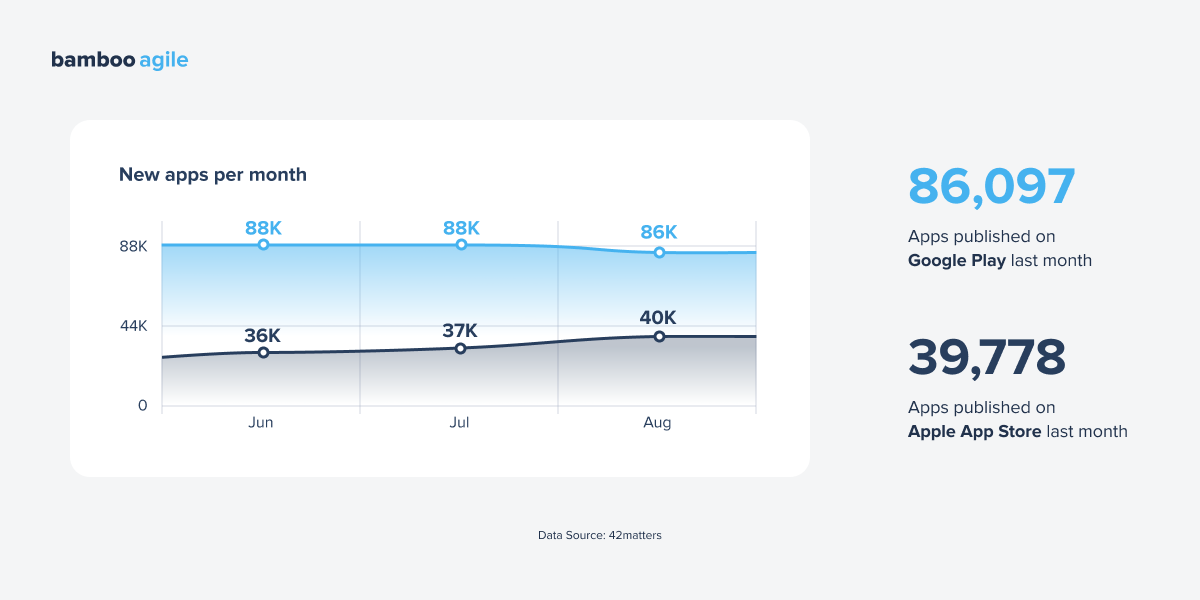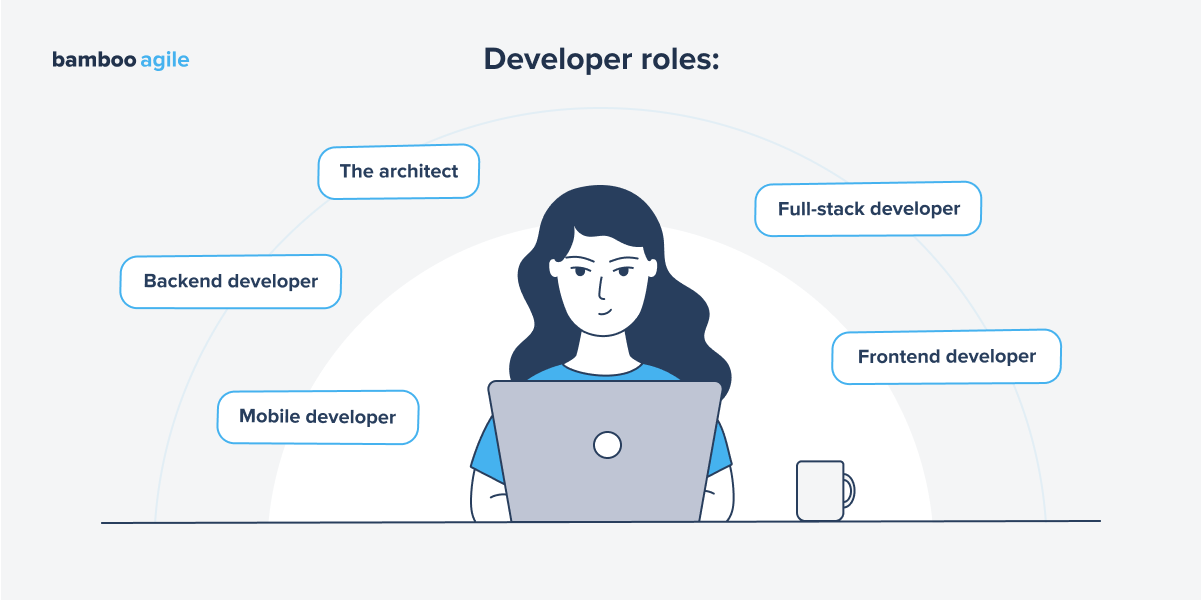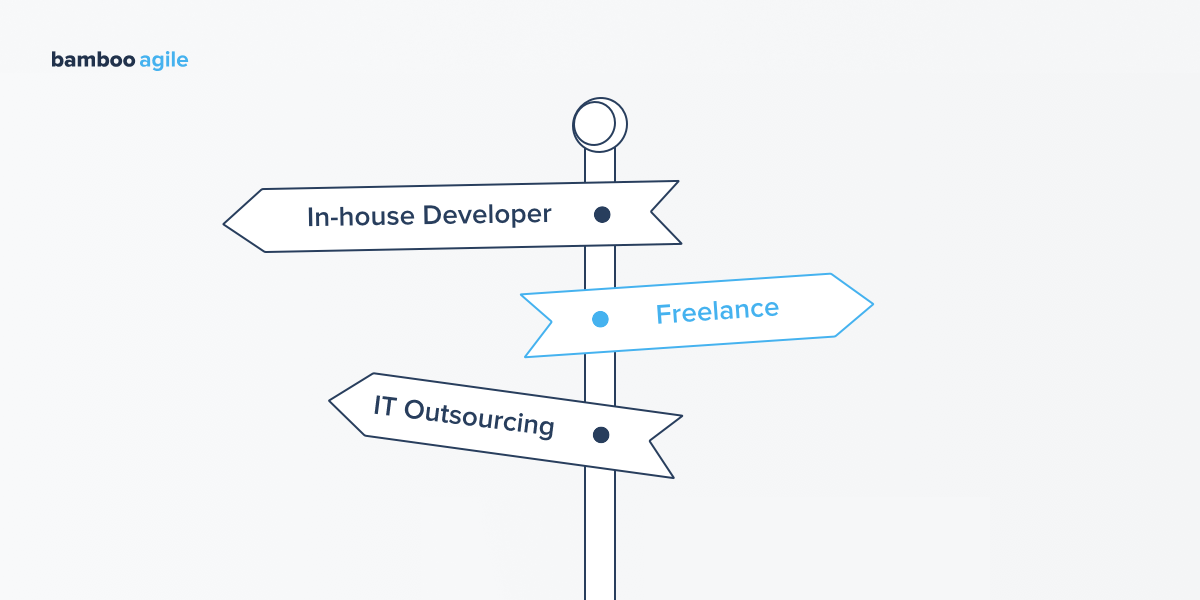Introduction
One of the most important things when creating a startup is the project team. It requires a lot of time and resources to properly assemble, and even then, there is no guarantee that the people you’ve found will work well as a group. The main question remains: how to hire developers for a startup (in this case, app developers) that fit your project perfectly? To answer that, let’s have a look at some important factors of the searching process.
Why is hiring developers for startups so attractive?
When hiring developers for a startup, you must have a clear vision on how they will contribute value to the company. You must carefully consider your priorities because a small company cannot afford to hire the wrong people, whether it’s through outsourcing or not.
Here are some compelling reasons why you should hire experienced engineers for your startup.
Set up the startup’s tech stack
What exactly are Node.js and Golang? To most startup entrepreneurs, these may sound like a random brand name, while to developers they’re a part of the technologies used to create a mobile app.
It’s fairly usual for company founders to have little to no experience with app development. Their role as business owners is to turn concepts into problem-solving software, not to learn how to code.
As a result, a startup must hire engineers who are well familiar with the tech stack required to construct the app.
Rapid growth
In July 2023, more than 87K apps were added to Google Play and more than 36K were added to the App Store. That is how fiercely competitive the app market is. As a startup, you’ll want to get your concept out there as soon as possible, test it, and develop it. Everything must be completed at breakneck speed.

If you’re looking for venture capital for your startup, you need something to show the investors. That means creating an MVP. For those not familiar with this term, a minimum viable product, or MVP, is a product with enough features to entice early adopters and verify a product concept early in the product development cycle. In many industries, MVP development can assist the product team in receiving customer input as soon as possible in order to iterate and enhance the product.
To achieve rapid growth as an early-stage startup, you’ll need a development team. Even if you’re a good coder yourself, you can’t be distracted from managing business development – it will just take your attention away from other aspects of your company.
Staying within your budget
Early-stage enterprises rely on money to survive. You must be diligent in your spending whether you are bootstrapping or have funding from investors. This includes hiring developers.
You have no choice but to be picky. It’s an issue of selecting the perfect applicants who will get the software to market as smoothly as possible. This entails hiring a developer with extensive experience, particularly in developing apps relating to your niche.
Hiring a well-experienced developer may seem pricey, but it will be better for the budget in the long run. At the beginning, it may seem cheaper to hire a rookie developer. But they may not have enough experience to tackle your project, and the costs of fixing their bugs and mistakes may end up being much higher than investing in a skilled developer.
When bargaining power is not in your favour, the pressure to make the correct hire within a constrained budget is felt.
Build a strong team
A skeleton structure cannot be used for long. Even if you’re an excellent multitasker, it’s very easy to get overwhelmed in a startup. You’ll soon need to assign responsibilities to your team members, including IT development issues.
As a result, you’ll need to look for applicants that match your startup’s goals and values as you construct a team of developers. It is preferable to have the team handle development from the start rather than bringing them in later.
An effective team is one that is well-versed in both the product and business operations. That is the reason for startups to hire coders with sufficient project and industry experience.
Challenges of hiring developers for startups
Every business owner dreams of assembling the perfect team of developers to transform their ideas into functional solutions. However, they must face the harsh reality of recruitment, which introduces unwelcome hurdles to their enterprises.
Lack of local talents
The world is becoming more digital. Large and small businesses alike are scrambling to get their operations online. This increases the demand for IT specialists. Unfortunately, the increase in local IT expertise falls short of meeting the rising need.
When it comes to finding candidates in the market, new businesses and startups are frequently on the losing end. Large organisations quickly acquire talented coders. When you only have a small pool of individuals to pick from, hiring becomes a time-consuming and costly procedure.
You can’t easily employ devs for your startup to fill out the crew. You may have to wait months or even years to find the appropriate person for a particular position. That is an unacceptable timeframe in the fast-paced world of today.
Competition
Even if you’ve already hired some promising IT developers, there’s no guarantee they’ll stay with you long enough to finish the project. Not with so many huge firms vying for their services.
It’s all fair game for large corporations to entice developers with benefits much beyond the reach of budget-strapped startups. At the end of the day, you’ll need to match the advantages offered or risk losing skilled developers you’ve worked hard to hire.
The loss of team members disrupts your timetable and might set you behind for months. And if you plan to re-hire, you’ll also have to pay for job advertisements and interviews.
Hiring issues
Startups’ attempts to hire great developers are hampered further by a lack of brand trust. You can have great ideas and aspirations, but a new startup is sometimes associated with insecurity and lesser pay for candidates.
This is made more difficult when you need a developer immediately and don’t know where to look. A startup does not have the advantages of an HR department that handles all of the headhunting and interviewing.
Management overload
A startup entrepreneur typically assumes many tasks, such as HR manager, accountant, and developer. This, however, may leave them with less time for critical duties like interviewing and selecting candidates. As a result, most founders use resources like LinkedIn to publish job adverts to recruit qualified applicants.
Unfortunately, due to a lack of trust, some developers may be hesitant to join a new organisation. Showing the workplace and upcoming products is critical during virtual interviews. You can also introduce the candidate to the members of the team. The final goal is to convince the candidate of the job’s prospects and stability.
Benefits of hiring outsourced developers for startups
Many startup owners prefer to outsource or hire remote developers Instead of hiring in-house ones. This is why.
Availability of tech talent
When you outsource, you are no longer restricted to the local developers’ pool, which is frequently rather limited. Instead, you will have the option of selecting the top IT developers from all around the world.
Outsourcing not only provides you with the best people, but it also saves you the long-term commitment of stable hiring. Given the risks that an early-stage firm faces, it makes sense to hire developers on a project basis.
Fast hiring
Hiring for permanent positions necessitates more consideration than hiring remote developers for a startup. With the former, you’ll need to assess whether the candidate possesses both hard and soft abilities that will allow them to fit in with the startup for years to come. Finding such prospects and making a judgement is not easy.
Outsourcing to a remote developer, on the other hand, is significantly easier. All you need to think about is whether the developer has the necessary skill sets to take on the current project. You don’t have to be concerned about whether they will fit into the company’s long-term strategy.
Flexibility
To create a functional app, you’ll need knowledge in a variety of domains. To create a native mobile app, for example, you’ll need an Android and iOS developer. A backend developer will also be required to create the backend part.
With outsourcing, you can select developers who have the necessary capabilities from an established team of specialists. There is no need to be concerned about long-term financial commitments because the contract is only for the duration of the project. Furthermore, if the workload increases, you can bring in more developers from the very same team.
Budget savings
Being frugal is a valuable trait for a startup entrepreneur. You’ll want to make every dollar count, which is where outsourcing IT development comes in. You are not required to pay set salaries, allowances, equipment, software, or training, unlike with a full-time worker.
When you are based in a country such as the United States or the United Kingdom, outsourcing is also cost-effective. Hiring local IT experts is more expensive than hiring developers from other countries. For example, you may recruit engineers in Eastern Europe for $25-$50 per hour, and in Asia for $18-$40 per hour. What matters is that there is no change in the quality of the deliverables.
If you’re specifically interested in Android app development, we have a great article on how to budget an Android project in 2023. Check it out!
Experience and expertise
As you employ developers with suitable experience for your startup, your chances of creating a successful app rise. You can choose developers for a startup with the necessary experience through outsourcing. They will avoid beginner mistakes, which often have an impact on the development timetable.
The global pool of IT developers is made up of specialists from many fields. You get to choose the greatest lineup for constructing your app with the least amount of hassle. These professionals require little assistance and are fast to get the process up and running.
What to consider before hiring a developer
You have to consider a lot of things before hiring a developer for your startup. Here are the most crucial points.
Define what you want to create
This is the most important question you should ask yourself: What is the purpose of my project?
Defining the software you want to create will help you hire the ideal developers for your startup. Are you trying to reach out to mobile consumers, web users, or both? Creating a digital solution for mobile and web will necessitate the use of native tools. A developer who is familiar with hybrid development technologies is required for an app that will run on mobile and web.
When it comes to mobile solutions, you may have to choose between Android and iOS. There are no overlaps in the application development process. You cannot expect an Android developer to create a comprehensive, native iOS application.
The opposite is also true.
Aside from that, both iOS and Android app development necessitates the use of a different SDK. That is why, before learning how to recruit a programmer for a startup, you must first determine the platform on which the software will be run.
Analyse your competitors
After choosing a platform, investigate current solutions along the same lines. Examine your competitors to ensure a better reception of your solution and the employment of the best programmers for your startup. Before learning how to hire programmers for your startup, you must first understand the viability of your product idea.
Once you’ve compiled a list of similar solutions, make the following notes:
- Their characteristics;
- What issues they solve;
- Who the perfect client is;
- How they intend to approach the client;
- Recognise their concerns and problems.
Getting the answers to these questions can help you visualise the type of solution you want to create. When you understand the critical application needs, hiring programmers will be easier. That way you’ll know what questions to ask the developer to better understand their skill set.
Define your solution
Create a how-to plan for your solution to discover the most suitable developers for your startup. Write everything down or make a rough draft of the app’s operating sequences. Create a UX and UI mockup of the application if possible. Additionally, create a user journey that demonstrates how you expect the user to interact with your solution.
You should also make a list of the features you wish to include in the MVP version.
Some of the default characteristics that are required for any application are as follows:
- Notifications;
- Sign-up or Registration;
- Profile Creation;
- Contact Support.
Aside from that, there are other solution-specific features to keep in mind. When hiring a programmer for a startup, you might ask feature-related questions to see how they approach the development process.
Finally, make a roadmap for the solution. To hire a programmer for your startup, you must understand how to reach each milestone. Set a budget and a timetable before inviting candidates for interviews.
Now let’s move on to the next step. Here you will learn how to discover and hire the necessary specialists for your firm. You’re familiar with the software development process, so it’s high time to talk about who exactly will participate in it.
Understand what to look for

According to a CB Insights survey, 23% of startups fail owing to insufficient teams. Working alone also takes 3.6 times longer to complete.
Always keep two things in mind here:
- Software development is not a solo job. You may hire a full-stack developer for the project, but no single person can perform every aspect of the work flawlessly.
- Not everyone is cut out for a career in software development. Before hiring engineers for a startup, it is critical to find the right person.
You must first comprehend the job description, profile, and needs of your task. For example, if you design web-based software, employing iOS mobile app developers will be ineffective.
So, moving forward, we will discuss several genres of developer and answer another crucial question about hiring a programmer for a startup. Yes, there are many types of developers. Let’s have a quick look at each.
The architect
The architect is a senior-level developer who is familiar with major cloud providers as well as CI/CD. They have the ability to develop automated, efficient, resilient, and rollbackable release pipelines, as well as scalable, cost-effective system architecture.
Architects are in charge of creating a sophisticated solution that meets the demands and goals of the organisation. They also lead the team, perform code and design reviews, and guide and support other developers throughout the development process.
Backend developer
A backend developer’s job is to manage the server side of development. The backend developer creates interfaces between the database and the platform that the user may access through managing databases, scripts, and architecture.
They are in charge of planning, implementing, and writing the logical code that powers the solution. The backend developer is also responsible for the overall performance and scalability of the product.
Frontend developer
A frontend developer works on the solution’s client side. This means they are in charge of the graphics and the app’s aesthetic appeal. Generally speaking, the frontend developer is responsible for how the end user interacts with the programme or website.
The frontend developer creates interactions and experiences using a digital solution. They do not work with technology, but rather with the human mind.
Assume you’re looking for programmers to work on hybrid or dual solutions for iOS and Android for a startup. In that case, they must be fully familiar with cross-compatibility and device-specific layouts to ensure a smooth user experience.
Full-stack developer
When searching for talent, you will also come across full-stack engineers for startups. A full-stack developer is skilled in both frontend and backend technologies. These are the CSS and HTML experts, as well as ASP, PHP, Node, Python, JSON, and other technologies.
Because a full stack developer understands the complexities of both the client and server sides, they will be accountable for completing the tasks anticipated for both sorts of services. Everything, from building outstanding interfaces to guaranteeing very effective and timely API interactions is their responsibility.
Mobile developer
Moving on, there are mobile developers. Interestingly, if you were starting a business before the turn of the century, you would not have heard of a mobile developer. Today, mobile developers are entrusted with developing mobile-based solutions.
They apply to any device and platform. Windows, iOS, or Android are all possible specialties. That is why we previously mentioned the importance of determining the platform on which you want to release your solution.
The primary task of a mobile app developer is to create native applications with platform-specific features and functionality. Let’s say you are developing a mobile-only application for your e-commerce store that will work on all operating systems. Then you’ll need to hire programmers with experience in mobile development, since they will have a better understanding of mobile software requirements, execution, and implementation.
Hiring options

To get the most out of your development team, you must understand how to hire programmers in the most efficient manner for your startup.
In-house employment
A traditional choice. This strategy has the advantage of a well-developed company culture and well-defined job responsibilities for each team member. It’s commonly employed in large corporations but is only seldom appropriate for startups.
A new professional’s career is governed by national legislation and necessitates a plethora of documents. Taxes, medical insurance, and vacation pay must all be covered by the hiring employer. Furthermore, HR and line managers must exert control over the staff. More often than not, it’s too much for a small company to handle.
Freelancers
According to Upwork, by 2028, 73% of all teams will feature remote individual workers. The most common way to hire developers for a startup is to place a vacancy on such services as LinkedIn, Glassdoor, upwork.com, StackOverflow Jobs, freelancer.com, and so on. In this case, be ready for a tiring selection process. Mind you, experienced specialists tend to avoid startup offers and work in companies that can offer software development outsourcing with more stable prospects.
The problem is that the website method leaves the employee unable to properly organise the workflow. Development teams must work as a single mechanism, control is crucial. So if one engineer slacks off and only creates the illusion of doing research and development, the whole project falls through. That’s not to say that all freelance programmers are no good – that’s just untrue. However, you should be extremely careful when choosing the perfect candidate. Don’t let your money go down the drain.
We wanted to find an honest opinion of people about hiring developers for startups. Here’s what we found on forums:
It’s very hard to hire freelance developers. You have to find very honest, organised people who are effective communicators, and happen to be great developers as well. Most people you find are going to lack in some area that prevents them from being successful in a remote/early stage startup (even if they’re great developers!)
When hiring a freelancer, you need to have a good technical understanding or it’ll cost far more and take far longer than you expect. It’s not in the interests of a freelancer to do a quick job or keep costs down. Making an MVP is the antithesis of how most developers work. They don’t benefit from finding the fastest, most effective way to validate your startup.
You can get around with a decent understanding, breaking the project down into smaller components. Push back against work that is unnecessary and their tendency to push you towards long term planning and features.
I have been hiring and firing freelancers for more than 7 years now and I’ve personally dealt with more than 500 individuals. Here are some of the common problems I have faced:
- Some freelancers promise a lot in order to get a job but upon hiring, they don’t live up to their promises or meet our expectations.
- At times they may not deliver on time. They may look good/skilled in the beginning but after a few days they may not be able to cope up with the nature of the job.
- They may quit abruptly due to another high paying job; in that case the projects they’ve been working on will suddenly have to be reassigned. You need to draft clear rules well in advance.”
Outsourcing company
It shouldn’t come as a surprise, but the highest quality developers are generally found in development companies that provide software development services for startups. According to Statista, the IT outsourcing market is predicted to be worth US$460.10 billion in 2023. The strategy is appropriate for a major project requiring a close-knit team of various IT specialists (designers, testers, etc.).
The information on said companies is featured on such resources as DesignRush, Clutch, Goodfirms, etc. All data is compiled in lists, so finding the ultimate developer for you is very easy.
You may think that their price is too high, but in reality, outsourcing tends to be the most cost-effective option for startups. If you want to hire developers for a startup in-house, it is likely to end up more expensive because of the extra spending that goes into recruiting, arranging a workspace, sick days, vacations, and other full-time benefits and/or overheads.
The process of outsourcing software development also removes the hassle of having to search for every single specialist yourself. This is especially convenient for those who are new to software development and aren’t sure what types of professionals their project will require exactly.
One of the key features of outsourcing companies is their flexibility, so it’s natural for them to provide specialists that are perfect for all kinds of solutions. This sort of range makes them very proficient since they’re able to construct a team that will help your idea achieve its maximum potential.
So, despite the seemingly higher costs, all of the abovementioned factors make outsourcing the safest choice for delivering a top-notch product.
Where to look for developers
This is the most important component of learning how to find a software developer for a company.
All of the trustworthy sources are listed below, along with some information on how to receive candidates from them.
Offline options
Meetups
This is where you’ll find the developers in action. Attend as many meetups as possible to discover a skilled coder for your startup. You may not always meet someone as eager as you would like. However, gatherings are still a fantastic place to get recommendations. Ask the people you meet to refer you to a reliable and energetic developer whose area of expertise is startup development.
Coworking
Coworking spaces have evolved into a melting pot of creativity and energy. You might find your ideal developer here, who may or may not be working on their own project. So, in addition to meeting an excellent programmer for your firm, you may also meet your founding partner. If not, you may also find a suitable freelancer who is willing to commit and has the necessary knowledge to assist you in succeeding.
Hackathons
Hackathons are also great ways to meet developers. However, these events make greater sense to those who have a thorough understanding of development. As a non-tech-savvy founder, you can accompany your technical coworker or simply ask around for the best option. Hackathon recommendations and references are incredibly useful and credible.
Conferences
Formal business gatherings and conferences will provide two results:
- Information about the latest industry insights, technologies, and trends;
- Developers who are aware of current trends and work with new technology.
Overall, conferences give you access to the best talent pool for hiring startup programmers. You can also join as a speaker at these conferences and get noticed by engineers. If they are sufficiently moved by your concept or product, they may even approach you directly.
Universities
What better location to find new talent than a university? Furthermore, the opportunistic environment present in startups encourages recent grads to start early. So you can go to universities as a recruiter. You’ll also learn about the trends currently popular with young developers.
Online options
Social media
Social media has evolved into a panacea for all of our ills. You can get almost anything on there if you know how – this includes finding a programmer for your startup..
Pitch your startup and idea on your social media profiles, or write a post about your needs. If you market the idea well, you will receive numerous responses to your request to employ engineers for startups. Include channels such as Facebook, LinkedIn, Twitter, Reddit, and others. You can also utilise these platforms to promote your product and use job ads to acquire talent.
Job Boards
Upwork, Toptal, Crossover, Hired, and Guru can also assist you in finding a programmer for your startup, but you must know how to use them. Different portals offer unique perks and features. If you need someone for a short period, sites like Upwork are ideal. Use Toptal for long-term committed persons.
Keep in mind that these portals will mostly assist you in locating freelancers. Furthermore, because you are creating a product from the ground up, it is preferable to hire someone for ongoing labour. Consider Indeed, Monster, Glassdoor, and Craigslist for this.
Communities
Stack, Github, Mashable, Angelist, and Overflow flourish because of the community. These platforms provide access to a large number of creative individuals. Furthermore, each of them has a dedicated profile where you may evaluate and get an understanding of their skills and experience.
Messengers
User-operated groups and channels in messengers such as Slack, Discord, and Telegram are also useful. Being a member of these channels will introduce you to a variety of people in your niche. These communities can help you get answers to numerous “how-to” questions and aid in finding a programmer for your startup.
How to secure your project when you hire developers for a startup

NDA
Your idea should be copy-protected, so be sure to take care of signing a non-disclosure agreement (NDA) before starting software development. An NDA guarantees the complete confidentiality of the project. If you don’t want to put your intellectual property at risk, do not start research and development without signing this document.
Keep in mind that the wording has to be very precise for the measures to work as intended. Be ready to dedicate some time to make sure everything is laid out as clearly as possible; perhaps, consult a lawyer to check that everything is accounted for and formatted correctly.
Not every freelancer will be willing to commit to an NDA, so be prepared for some of them to reject the work on your project under this condition. In this case, outsourcing is a lot easier to deal with, since offshore developers are more than willing to sign such an agreement. A lot of these companies will help you compose the document as well.
Confirmation of the idea
The ultimate way of protecting your IP after a copyright infringement is a court proceeding. In court proceedings, it is important to prove that you began to work on the implementation of the idea in question first and that the other person stole the initial concept.
To obtain such temporal evidence, it’s recommended to write down all the information related to the idea on paper or a disk, and then send it to your address in a sealed envelope. Once received, the envelope cannot be opened – it will become an important piece of evidence for the court. While not obligatory, it can turn the tide of a seemingly unwinnable cause.
Working with specialists from your country
Depending on your location, working with local specialists can be either very convenient or terribly inefficient. Hiring professionals from your home country comes with a couple of substantial benefits, such as similar timezones, easier communication, and likemindedness (as well as a far more straightforward legal process).
But offshore companies might actually be more effective in terms of development costs. There is a good reason why many customers in the US and Western Europe prefer outsourcing software development for startups to Eastern European and Indian specialists. The fact of the matter is, some countries have much lower tax rates and, consequently, much lower hourly developer rates.
Considering the fact that skill levels of Eastern European software engineers compare favourably to their Western competitors, the lower price tag makes them an obvious choice for many client companies that want research and development. International copyright laws still apply, so as long as you sign an NDA agreement, you have very little to worry about.
Final words
Hiring developers for a startup is really hard work. Whether to choose in-house developers, freelancers, or a company that offers custom software development services for startups is up to you. However, as mentioned above, offshore development companies tend to provide the best value for promising startups.
If you have an ambitious idea of your own but aren’t sure how to set the development in motion, simply contact the Bamboo Agile team by filling out this form. Our industry specialists will gladly give you a free consultation and help solve your tech startup’s hiring problems.



